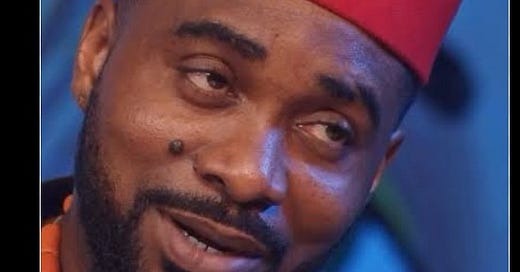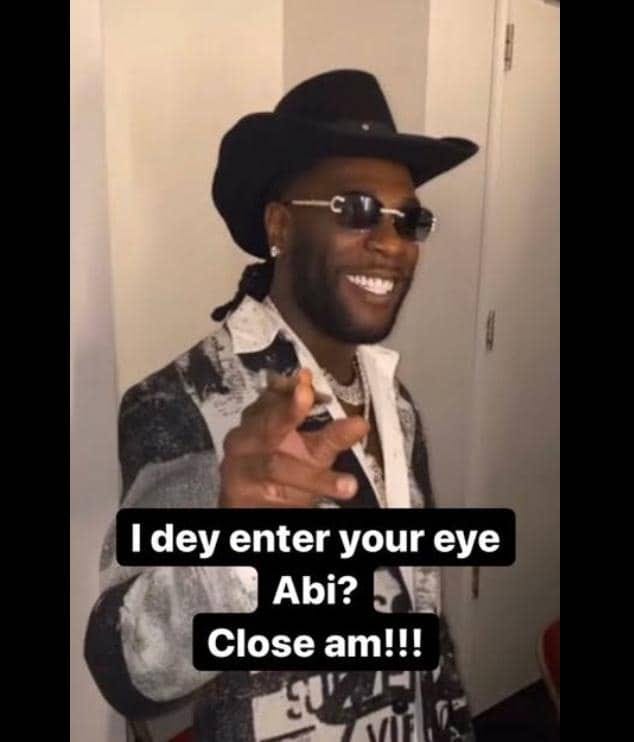“The man won not necessarily because he was the best of the pack. He won because he was the one whose pockets best aligned with the demands of the electors”
Lasisi Olagunju- Monday lines
Achalugo: Gi gbu afayi?(What is your name?)
Odogwu:Hmmm, you're asking what my name is?
Well, I'm what they call a typical Igbo man.I own a house or two in the Obodo - oyinbo and a few more across Nigeria. My presence is felt in Onitsha market where I oversee two or three thriving shops.A man of my standing must keep his dealings in order so I have two phones - one for business and the other for personal affairs. I am a man of clarity—I say what I mean, and I back it up with actions.Nne, I'm an intentional man.
Culled from Google
I walk with the steady grace of a man who carries both history, authority and of course a slightly protruding belly. My trusty walking stick is a symbol of dominance, to exert and stamp my authority. No bi ordinary stick you dey see for my hand so. My steps? Measured, deliberate—like one who moves with the weight of wisdom or, as some might say, like a man with an enlarged scrotum.No mind dem, they're just jealous.
I am an Ozo title holder. For context, this prestigious title is often conferred upon individuals of wealth and influence— I mean men who have made significant contributions to their community or demonstrated exceptional character. This title eh is not just a title; it is a responsibility, a tradition and a leadership role. I reave in Lagos and somewhere beyond this city’s baddies is a flower I hope to pluck—my obim, a true Asanwa and my achalugo.
I have audacity oh, one that befits an Igbo man. My spending habits speak for me—I do not hesitate to go all in for those who stand with me. I mean dorrarss is nothing. My fellow Igbo people say, Ike di na awaja na awaja—power flows through many channels, yes! It also flows in my veins and it's plenrii!
I am Chief Okafor Osodieli aka Odogwu paranran. Some people refer to me as Odogwu silencer because of my steady spending moves. My fellow politicians call me the man of the people. Yes! The man of the people is one whose pockets is the heaviest. He speaks as the head in family meetings, decides the next best action and gives the vote of thanks in family thanksgivings/birthdays.The grass has to always be green and there's no room for dry season. Here in my land, the race is truly to the swift and mighty.
…….”His name is Jehovah, Iron breaker”…….
I stand up to effectively enact the serious moves of my favourite song before settling again in my cushion. On this laid back Saturday morning, over a meal of abacha and palm wine, I thought about my position in the society and the expectations saddled with it.Chief Osita Osadebe’s Osondi Owendi played softly in the background as I nursed a question that had lingered in my mind since the day I received my Ozo title.
Igbo enwe(ghi) eze—the Igbos have no king.
The Igbo people have long been described as a stateless society, one without a central, explicit form of government. The missionary, Samuel Ajayi Crowther once observed that a major disadvantage of Igbo society was "the want of a king who is the supreme head of the nation." However, governance in Igboland was never rooted in monarchy but in the strength of titled societies—particularly the Ozo and Nze, conferred upon men of honor and virtue.
Titles in Igbo society are not mere decorations; they are symbols of wealth, influence, and prestige. They carry with them the expectation of service, making titleholders respected role models whose voices matter in public affairs.
As Victor Uchendu noted, “The right to participate in izusu(communal contribution or fundraising) is a greatly cherished and respected one, restricted to men of weight and prestige.”
I'm saying that men like me should not be messed with. I have power and voice, my dorrarss gives me that.
Over time, political authority in some Igbo communities gradually shifted from institutions based on age and kinship to those defined by wealth. The wealthy, through their membership in title societies, increasingly monopolized political power.
It has been suggested that Ozo titleholders constituted the largest group of titled men in Igbo culture, reinforcing a system where the acquisition of wealth directly aligned political influence
(Adedire and Okunade, 2019)
This shift significantly reduced the relevance of traditional descent-based leadership, making prestige and power more accessible to those who could afford it.
As Nwaubani (1965) observed, political power in Igbo society was deeply intertwined with personal wealth, blurring the lines between leadership and economic status.
So sitting there, listening to Osadebe and watching the uncertain sky, I couldn't help but wonder—if without my financial status, I'd still be a leader and if truly, Igbo culture places too much on materialism. However, that's a discussion for another day. So Nne,you were asking, “gi gbu afayi”?
Biko, I am Chief Okafo Osodieli and I know for a fact that you will be my wife, Achalugo.






Well said